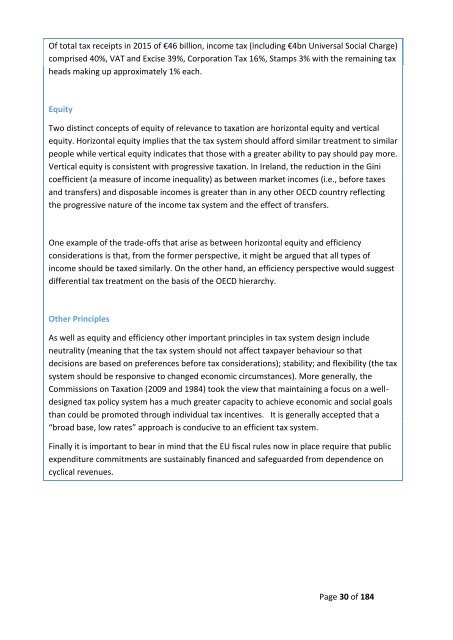Minister’s Brief
20160229%20Minister%20for%20Finance%20Brief%20redacted%20web
20160229%20Minister%20for%20Finance%20Brief%20redacted%20web
You also want an ePaper? Increase the reach of your titles
YUMPU automatically turns print PDFs into web optimized ePapers that Google loves.
Of total tax receipts in 2015 of €46 billion, income tax (including €4bn Universal Social Charge)<br />
comprised 40%, VAT and Excise 39%, Corporation Tax 16%, Stamps 3% with the remaining tax<br />
heads making up approximately 1% each.<br />
Equity<br />
Two distinct concepts of equity of relevance to taxation are horizontal equity and vertical<br />
equity. Horizontal equity implies that the tax system should afford similar treatment to similar<br />
people while vertical equity indicates that those with a greater ability to pay should pay more.<br />
Vertical equity is consistent with progressive taxation. In Ireland, the reduction in the Gini<br />
coefficient (a measure of income inequality) as between market incomes (i.e., before taxes<br />
and transfers) and disposable incomes is greater than in any other OECD country reflecting<br />
the progressive nature of the income tax system and the effect of transfers.<br />
One example of the trade-offs that arise as between horizontal equity and efficiency<br />
considerations is that, from the former perspective, it might be argued that all types of<br />
income should be taxed similarly. On the other hand, an efficiency perspective would suggest<br />
differential tax treatment on the basis of the OECD hierarchy.<br />
Other Principles<br />
As well as equity and efficiency other important principles in tax system design include<br />
neutrality (meaning that the tax system should not affect taxpayer behaviour so that<br />
decisions are based on preferences before tax considerations); stability; and flexibility (the tax<br />
system should be responsive to changed economic circumstances). More generally, the<br />
Commissions on Taxation (2009 and 1984) took the view that maintaining a focus on a welldesigned<br />
tax policy system has a much greater capacity to achieve economic and social goals<br />
than could be promoted through individual tax incentives. It is generally accepted that a<br />
“broad base, low rates” approach is conducive to an efficient tax system.<br />
Finally it is important to bear in mind that the EU fiscal rules now in place require that public<br />
expenditure commitments are sustainably financed and safeguarded from dependence on<br />
cyclical revenues.<br />
Page 30 of 184


